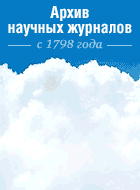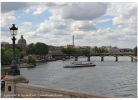Другие журналы
scientific edition of Bauman MSTU
SCIENCE & EDUCATION
Bauman Moscow State Technical University. El № FS 77 - 48211. ISSN 1994-0408
Parametric Optimization of Control Systems Pumping Station by the Genetic Algorithms
# 08, August 2014
DOI: 10.7463/0814.0721172
Article file:
 SE-BMSTU...o205.pdf
(875.40Kb)
SE-BMSTU...o205.pdf
(875.40Kb)
Now the frequency regulation with its well-known advantages is becoming more popular for using in electric drives. One of these systems is the system of liquid flow stabilization for pumping station of the second flood, which is discussed at the article. There are functional elements of the system: the frequency converter, the induction motor, pump set, check valve, part of the pipeline between the flow sensors and PID controller. In this case are used PID controller with universal input and RS-485 OWEN TRM101. The article tries to solve the main problem, which is to set optimal controller settings.
The article presents a mathematical model of the system, built on the basis of transfer functions. The specific values of the parameters for Bratsk pumping station of the second flood are found.
To solve the problem of parametric optimization for control of pumping station authors use a genetic algorithm, which allows us to use different quality criteria. A set of parameters for the genetic algorithm is represented, as well as a method of selection and a method of the transition between generations. The problem of parametric optimization was solved by quadratic integral criterion and by the criterion, composed of direct measures of quality (regulation time and the overshoot). The PID controller optimal values of adjustable parameters were obtained both for considered criteria and for their corresponding transient processes. Comparative analysis of results was produced. When proving the optimality of the obtained settings for the quadratic criterion the proximity of the gradient components of the target functional to zero is demonstrated. In the case of a criterion based on a direct measure of quality, is presented a picture of convergence of adjustable parameters to the same value when run with different starting points.
It is presented that the use of a criterion based on a direct measure of quality, can significantly reduce the overshoot with a comparable regulation time.
References
- Saad M.S., Jamaluddin H., Darus I.Z.M. Implementations of PID-controller tuning using differential evolution and genetic algorithm. International Journal of Innovate Computing, Information and Control, 2012, vol. 8, no. 11, pp. 7761-7779. Available at: http://www.ijicic.org/ijicic-11-07073.pdf, accessed 25.02.2014.
- Chen Y., Ma Y., Yun W. Application of Improved Genetic Algorithm in PID Controller Parameters Optimization. Telkomnika, 2013, vol. 11, no. 3, pp. 1524-1530. Available at: http://www.iaesjournal.com/online/index.php/TELKOMNIKA/article/viewFile/2301/pdf, accessed 25.02.2014.
- Jaen-Cuellar A.Y., Romero-Troncoso R.de J., Morales-Velazquez L., Osornio-Rios R.A. PID-Controller Tuning Optimization with Genetic Algorithms in Servo Systems. International Journal of Advanced Robotic Systems, 2013, vol. 10, p. 324. DOI: 10.5772/56697
- Ayman A.A. PID Parameters Optimization Using Genetic Algorithm Technique for Electrohydraulic Servo Control System. Intelligent Control and Automation, 2011, no. 2, pp. 69-76. DOI: 10.4236/ica.2011.22008
- Slavov T., Roeva O. Application of Genetic Algorithm to Tuning a PID Controller for Glucose Concentration Control. Electronic journal: WSEAS Transactions on Systems, 2012, vol. 11, no. 7, pp. 223-233. Available at: http://www.wseas.org/multimedia/journals/systems/2012/55-286.pdf, accessed 17.02.2014.
- Trukhanov K.A., Popov D.N. Selection of the optimum parameters for the hydraulic drive of a fan of the vehicle’s engine cooling system.Nauka i obrazovanie MGTU im. N.E. Baumana = Science and Education of the Bauman MSTU, 2013, no. 7, pp. 91-100. DOI: 10.7463/0713.0590873
- Sabanin V.R., Smirnov N.I, Repin A.I. Modified genetic algorithm for optimal control problems. Exponenta Pro, 2004, no. 3-4 (7-8), pp. 78-85. (in Russian).
- Iliushchenko V.V. Metody povysheniia nadezhnosti apparatnykh sredstv avtomatizirovannykh sistem upravleniia nasosnymi stantsiiami. Kand. diss. [Methods of increasing the reliability of hardware of automated systems of pumping plants. Cand. diss.]. Irkutsk, 2011. 154 p. (in Russian).
- Makshantsev V.G., Stativa K.Iu., Ol'khovskii M.A. Research and simulation electric drive pumping station with frequency regulation for hydraulic shooting down dross in rolling mill. Vicnik Donbas'koi mashinobudivnoi akademii, 2007, no. 2E (10), pp. 134-141. (in Russian).
- Kliuchev V.I. Teoriia elektroprivoda [Theory of electric drive]. Moscow, Energoatomizdat Publ., 2001. 704 p. (in Russian).
- Dudnikov E.G. Avtomaticheskoe upravlenie v khimicheskoi promyshlennosti [Automatic control in chemical industry]. Moscow, Khimiia Publ., 1987. 367 p. (in Russian).
- Denisenko V. PID controllers: issues of implementation. Part 1. Sovremennye tekhnologii avtomatizatsii = Contemporary Technologies in Automation, 2007, no. 4, pp. 86-97. (in Russian).
- PID-reguliator s universal'nym vkhodom i interfeisom RS-485 OVEN TRM101 [PID controller with universal input and RS-485 interface OWEN TRM101]. OWEN LLC: company website. Available at: http://www.owen.ru/uploads/trm101.pdf, accessed 10.02.2014. (in Russian).
- Kutsyi, N.N., Luk'ianov N.D. Using genetic algorithm for optimization of automatic systems with PID control. Vestnik IrGTU, 2012, no. 6, pp. 6-11. (in Russian).
- Moshnoriz N.N. Development of model of the control system by pump station of the second rise. Naukovi pratsi VNTU, 2007, no. 1, pp. 1-5. (in Ukrainian, in Russian, in English).
Publications with keywords: genetic algorithm, PID-regulators, hydraulic power pack, direct indicators of quality
Publications with words: genetic algorithm, PID-regulators, hydraulic power pack, direct indicators of quality
See also:
Thematic rubrics:
Поделиться:
| Authors |
| Press-releases |
| Library |
| Conferences |
| About Project |
| Phone: +7 (915) 336-07-65 (строго: среда; пятница c 11-00 до 17-00) |
|
||||
| © 2003-2024 «Наука и образование» Перепечатка материалов журнала без согласования с редакцией запрещена Phone: +7 (915) 336-07-65 (строго: среда; пятница c 11-00 до 17-00) | |||||



